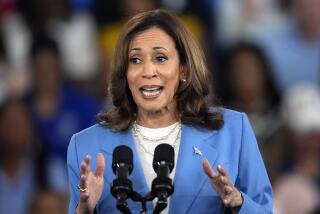Obama wants short-term alternative to sequestration cuts
WASHINGTON -- Seeking to avoid steep spending cuts scheduled to begin March 1, President Obama will call on Congress on Tuesday to devise an alternative package of reductions and new tax revenue that could postpone the deeper cuts for a few months.
The president’s remarks, scheduled for 1:15 p.m. EST Tuesday in the White House briefing room, comes as the economy showed a slight dip and economists warned against severely cutting back on federal spending. Obama is seeking a short-term fix that could buy time while Congress compiles its budgets this spring “to avoid the economically harmful consequences” of the so-called sequester cuts, a White House official said.
“While we need to deal with our deficits over the long term, we shouldn’t have workers being laid off, kids kicked off Head Start, and food safety inspections cut while Congress completes the process,” the official said.
Senate Majority Leader Harry Reid (D-Nev.) has already indicated that such a short-term fix is in the works.
PHOTOS: President Obama’s past
Senate Democrats, meeting at their annual policy retreat in Annapolis, Md., this week, are considering options that would postpone the cuts for a few months – or up to a year. Democrats want to swap the across-the-board cuts for revenue that would come from ending tax breaks for oil and gas companies, as well as closing a tax loophole that allows deductions for corporate jets, among other options.
“What we think would be a better effort would be to move forward and, on short increments, pay for the sequestration,” Reid said last week. “There are many low-hanging pieces of fruit out there that Republicans have said they agreed on previously.”
But prying new tax revenue from Republicans will prove difficult, especially after the party allowed higher tax rates as part of the year-end “fiscal cliff” deal. Republicans see the sequester as one of their best opportunities to secure steep cuts, and they want to push reductions away from the Pentagon and onto domestic programs, including reductions in Medicare, food stamps and other elements of the federal safety net.
Sen. Mitch McConnell, the Republican minority leader, dismissed the Democratic efforts at new taxes this week as “gimmicks.”
PHOTOS: President Obama’s second inauguration
“We believe there is a better way to reduce the deficit, but Americans do not support sacrificing real spending cuts for more tax hikes,” said House Speaker John A. Boehner. “The president’s sequester should be replaced with spending cuts and reforms that will start us on the path to balancing the budget in 10 years.”
“If you were to listen to the Democrats, you’d think all of our ills could be solved by raising taxes on private jets or energy companies,” said McConnell of Kentucky. “These aren’t real solutions.”
The $1.2 trillion in sequester cuts have been looming over Washington ever since they were first approved as part of the 2011 deal Obama made with Congress when Republicans sought to extract deep spending cuts in exchange for raising the nation’s debt ceiling.
Those cuts were once thought to be so severe – slicing equally across defense and domestic accounts for the next decade -- that they would force Congress to come up with a better deficit-reduction alternative.
A small alternative package of cuts had been agreed to as part of the New Year’s “fiscal cliff” deal, chiseling $24 billion off this year’s costs. That postponed the sequester until March 1.
QUIZ: Test your knowledge about the debt limit
But finding another option has proven difficult in partisan Washington.
Another $85 billion in alternative cuts or new revenue would be needed for this year alone -- and $960 billion for the decade.
The revenue from ending oil and gas industry tax breaks, for example, would provide a few months’ reprieve.
Conservative Republicans have begun to say that even the deep defense cuts they dislike are better than no cuts at all.
With the March 1 deadline looming, lawmakers have increasingly become convinced the cuts will go into effect, at least temporarily, sparking worries that the contraction of federal spending could harm the economy.
Follow Politics Now on Twitter and Facebook
Twitter:
More to Read
Sign up for Essential California
The most important California stories and recommendations in your inbox every morning.
You may occasionally receive promotional content from the Los Angeles Times.












